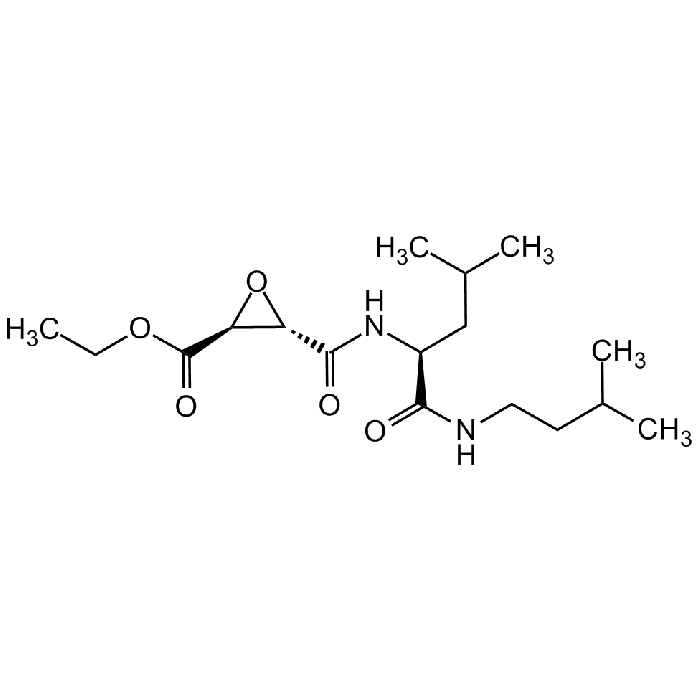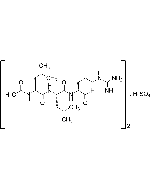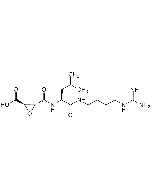Cookie Policy: This site uses cookies to improve your experience. You can find out more about our use of cookies in our Privacy Policy. By continuing to browse this site you agree to our use of cookies.
AdipoGen Life Sciences
Aloxistatin [E-64d]
As low as
45
CHF
CHF 45.00
In stock
Only %1 left
AG-CR1-3737-M0011 mgCHF 45.00
AG-CR1-3737-M0055 mgCHF 90.00
AG-CR1-3737-M02525 mgCHF 270.00

| Product Details | |
|---|---|
| Synonyms | E-64c ethyl ester; EP 453; EST; Loxistatin |
| Product Type | Chemical |
| Properties | |
| Formula |
C17H30N2O5 |
| MW | 342.4 |
| CAS | 88321-09-9 |
| RTECS | RR0404300 |
| Purity Chemicals | ≥95% (HPLC) |
| Appearance | White to off-white powder. |
| Solubility | Soluble in DMSO (20mg/ml), DMF (20mg/ml) or ethanol (5mg/ml). |
| Identity | Determined by 1H-NMR. |
| InChi Key | SRVFFFJZQVENJC-IHRRRGAJSA-N |
| Smiles | O=C(OCC)[C@H]1O[C@@H]1C(N[C@H](C(NCCC(C)C)=O)CC(C)C)=O |
| Shipping and Handling | |
| Shipping | AMBIENT |
| Short Term Storage | +4°C |
| Long Term Storage | -20°C |
| Handling Advice |
Keep cool and dry. Keep under inert gas. Protect from moisture and oxygen. |
| Use/Stability | Stable for at least 2 years after receipt when stored at -20°C. |
| Documents | |
| MSDS |
 Download PDF Download PDF |
| Product Specification Sheet | |
| Datasheet |
 Download PDF Download PDF |
Description
- Aloxistatin [E-64d] is a cell permeable irreversible inhibitor of lysosomal and cytosolic cysteine proteases cathepsin B an L, calpain 1/2, papain and has diverse biological activities. It is an ethyl ester form of E-64c that inhibits calpain and the cysteine proteases cathepsins F, K, B, H, and L.
- Aloxistatin has anticancer properties by inducing cell cycle arret at the G2/M phase in A431 human epidermoid carcinoma cells and as a lysosomal inhibitor in human acute promyelocytic leukemia NB4 cells and Huh-7 cells. It inhibits degradation of autophagic cargo inside autolysosomes.
- It also shows neuroprotective and anti-malarial properties.
- Since cysteine protease cathepsin L is required for SARS-CoV-2 viral entry, aloxistatin treatment reduces cellular entry of SARS-CoV-2 pseudovirions and COVID-19. It inhibits severe acute respiratory syndrome coronavirus (SARS-CoV) and SARS-CoV-2 surface glycoprotein incorporation into pseudotyped vesicular stomatitis virus (VSV) particles in Vero cells. Is has been applied in vitro in combination with the TMPRSS2 inhibitor camostat mesylate (Prod. No. AG-CR1-3716).
Product References
- In vitro and in vivo inhibition of cysteine proteinases by EST, a new analog of E-64: M. Tamai, et al.; J. Pharmacobiodyn. 9, 672 (1986)
- Thiol protease-specific inhibitor E-64 arrests human epidermoid carcinoma A431 cells at mitotic metaphase: Y. Shoji, et al.; PNAS 85, 146 (1988)
- Inhibition of Calpain in intact platelets by the thiol protease inhibitor E-64d: E.B. McGowan, et al.; Biochem. Biophys. Res. Commun. 158, 432 (1989)
- Inhibition of cysteine proteinases in lysosomes and whole cells: D. Wilcox & R.W. Mason; Biochem. J. 285, 495 (1992)
- Increased calpain expression is associated with apoptosis in rat spinal cord injury: calpain inhibitor provides neuroprotection: S.K. Ray, et al.; Neurochem. Res. 25, 1191 (2000)
- Neurovascular and neuronal protection by E64d after focal cerebral ischemia in rats: T. Tsubokawa, et al.; J. Neurosci. Res. 84, 832 (2006)
- Inhibition of Plasmodium falciparum oocyst production by membrane-permeant cysteine protease inhibitor E64d: S. Eksi, et al.; Antimicrob. Agents Chemother. 51, 1064 (2007)
- SARS-CoV-2 cell entry depends on ACE2 and TMPRSS2 and is blocked by a clinically proven protease inhibitor: M. Hoffmann, et al.; Cell 181, 271 (2020)
- Spatiotemporal organisation of protein processing in the kidney: M. Polesel, et al.; Nature Commun. 13, 5732 (2022)











![Loxistatin acid [E-64c]](https://adipogen.com/media/catalog/product/cache/60eb5af712bc93baae8d55513bd31b01/a/g/ag-cp3-7007.png)